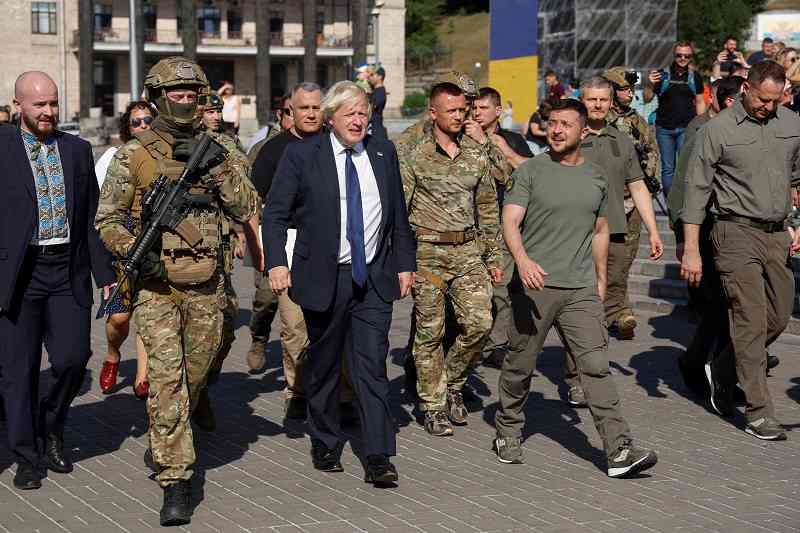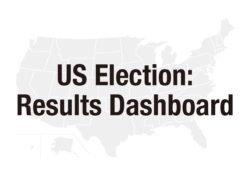Ukraine is a war zone. And a place Boris Johnson can get away from it all.

British Prime Minister Boris Johnson and Ukrainian President Volodymyr Zelenskiy walk at the Independence Square during an airstrike alarm, amid Russia’s attack on Ukraine, in Kyiv, Ukraine August 24, 2022.
14:25 JST, August 25, 2022
LONDON — So Boris Johnson popped up in Ukraine on Wednesday. The unannounced appearance shocked, but it did not really surprise.
Wartime Ukraine has offered a kind of respite for the embattled British prime minister, who has only a few weeks left as head of government. The visit to Kyiv, to celebrate Ukraine’s independence day, was his third to Ukraine since Russia invaded six months ago.
In comments made next to Ukrainian President Volodymyr Zelensky at the Mariyinsky Palace, Johnson said Ukraine “can and will win this war.” Russian President Vladimir Putin had been “insane” to invade, he said, and added: “If we’re paying in our energy bills for the evils of Vladimir Putin, the people of Ukraine are paying in their blood.”
Back in London, Downing Street marked the moment with an arch of blue and yellow flowers, the colors of Ukraine’s flag, outside its famous black door.
Johnson has been an outspoken supporter of Ukraine. Not only was he one of the First World leaders to visit Ukraine in person, but his government moved quicker than many in providing antitank weapons and financial support.
Perhaps unsurprisingly, when things soured on the home front, Johnson could still count on being lauded in Ukraine. A street on the outskirts of Odessa was relabeled “Boris Johnson Street.” A bakery in Kyiv named a pastry after him. Ordinary Ukrainians reportedly call him “Johnsonuk” and his picture pops up frequently in WhatsApp chats.
While his opponents back home were accusing him of leading a zombie government that is failing to address a cost-of-living crisis, Johnson on Wednesday was awarded the Ukrainian “Order of Liberty” medal, the highest honor the country bestows on those who are not Ukrainian.
Even his critics would concede that he was having a good war, until he lost his job. After a string of scandals, dozens of Conservative Party lawmakers said they lost confidence in Johnson, leading him to resign as prime minister after three years. He leaves office on Sept. 6, the day after the Tories choose his replacement. He will remain a member of Parliament for Uxbridge and South Ruislip.
Ukraine will be a major part of Johnson’s legacy. “His legacy in office? Brexit and then vaccinations. But Ukraine plays a big part,” said biographer Andrew Gimson, who has a book coming out next month on Johnson’s rise and fall. Gimson expects Johnson to continue to play some kind of role on Ukraine, whether it is speeches in Parliament, newspaper columns, social media posts or surprise visits to Kyiv, possibly in ways that upstage or annoy his successor.
“Johnson has a habit of inserting himself into the conversation,” Gimson said. “He likes to show that anything the prime minister is doing, he can do better.” During the David Cameron years, for instance, Johnson regularly upstaged the prime minister at the Conservative Party’s annual conferences, delivering colorful speeches that delighted the party faithful and sparked speculation about his leadership ambitions.
Johnson and Zelensky also appear to have a personal affinity for each other. In a statement after news of Johnson’s resignation, Zelensky said, “We all heard this news with sadness. Not only me, but also the entire Ukrainian society, which is very sympathetic to you. We have no doubt that Great Britain’s support will be preserved, but your personal leadership and charisma made it special.”
When Zelensky addressed the British House of Commons, his speech included a line that echoed a refrain from Prime Minister Winston Churchill, Johnson’s hero.
Critics accuse Johnson of promoting his trips to Ukraine and conversations with Zelensky to distract from “partygate” and other scandals back home. Downing Street has repeatedly denied any connection.
Gimson disagrees. “Ukraine was for him an opportunity to talk about a very important defense and foreign policy question that had nothing to do with whether a bottle of Prosecco had been drunk at the end of a long day in Downing Street,” he said. “Like many leaders, Johnson tries to deal with difficult conversations by changing the subject.”
"News Services" POPULAR ARTICLE
JN ACCESS RANKING







